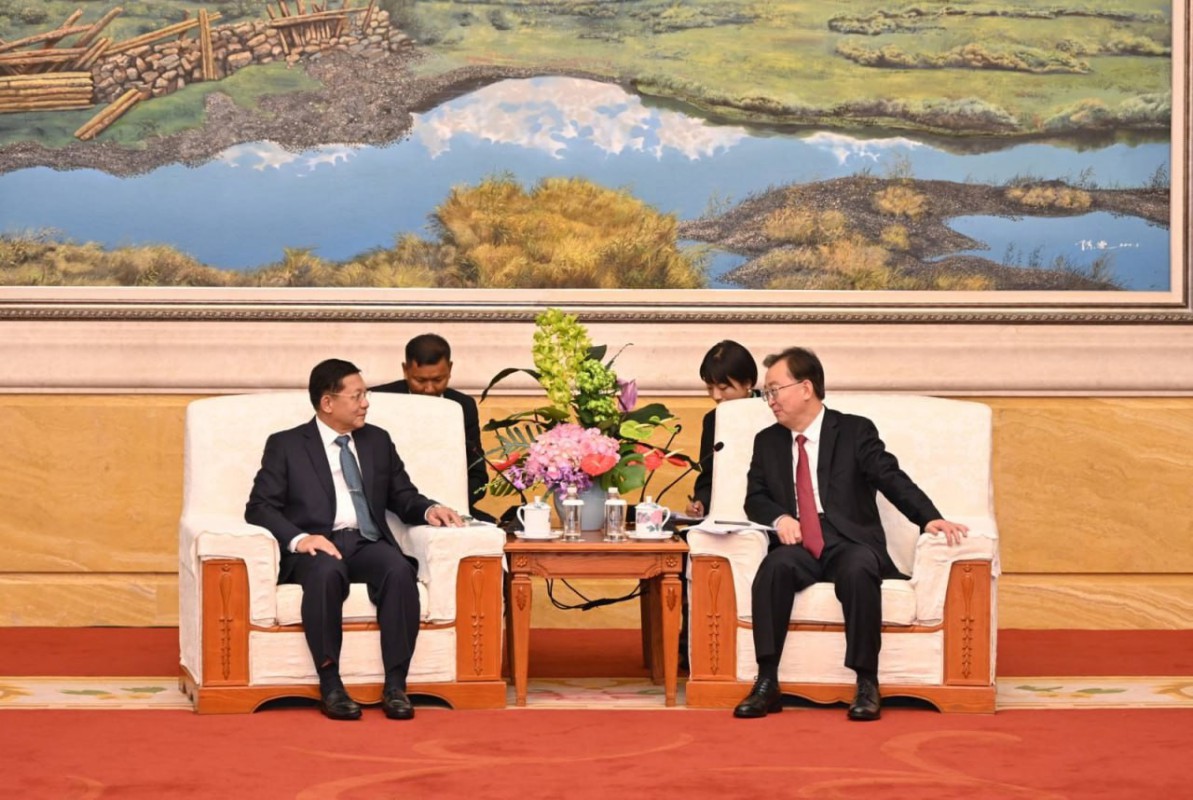Myanmar refocuses diplomatically: Strengthening ties with China and India

1326

Tin Zar Lynn (NP News) - Nov 11
In the first week of November, Myanmar has refocused on its diplomatic efforts, as evidenced by its engagement with two key neighbouring countries: China and India. One significant development is the visit of Myanmar's leader to China, while another notable event is the participation of Myanmar’s representatives in a lecture series in India. Both of these engagements hold substantial state-level importance and are expected to have a meaningful impact on Myanmar's foreign relations. These diplomatic actions highlight Myanmar's strategic efforts to strengthen ties with its neighbours and enhance its position on the regional stage.
Building stronger bilateral ties with China
Senior General Min Aung Hlaing, Myanmar’s Commander-in-Chief of the Defence Services and Chairman of the State Administration Council, completed an official visit to China from November 5 to 7, accompanied by other key officials. The visit focused on attending significant regional events, including the 8th Greater Mekong Subregion (GMS) Summit and related meetings in Kunming, as well as the 10th Ayeyarwady-Chao Phraya-Mekong Economic Cooperation Strategy (ACMECS) Summit and the 11th Cambodia-Laos PDR-Myanmar-Vietnam (CLMV) Summit. A major highlight of the trip was the discussions with senior Chinese officials, aimed at strengthening bilateral cooperation across economic and other sectors, which is expected to enhance both government-to-government and people-to-people ties between the two nations.
Upon his arrival in Yunnan, China, the leader immediately met with the secretary of the Yunnan Provincial Party Committee, member of Communist Party of China (CPC) where the primary focus of their discussion was border security. This issue is particularly significant for Myanmar’s civil war, which involves the Tatmadaw and various ethnic armed groups along the Myanmar-China border. China is also concerned with Myanmar’s security due to its direct relevance to its own border stability.
Myanmar-China relations have been in place since 1950, lasting for 74 years and approaching a "Diamond Anniversary." Both countries aim to build a peaceful community. As a result, Myanmar’s priority is maintaining stability, especially in light of the current internal situation, which can only be achieved in part by the Tatmadaw. This perspective has also been acknowledged by the Chinese government. It was underscored in a document from a meeting between Mr. Deng Xijun, the Chinese special envoy for Myanmar, and representatives of the United Wa State Army (UWSA). During this meeting, Mr. Deng emphasized that neither Daw Aung San Suu Kyi nor the National Unity Government (NUG) could replace the role of the Tatmadaw, highlighting the military's importance in Myanmar's political landscape.
We hope that Senior General Min Aung Hlaing’s visit will further strengthen the strategic relationship between Myanmar and China, reflecting both nations' shared interests in regional security and economic cooperation. This partnership is poised to contribute to stability in the region while enhancing bilateral ties across multiple sectors.
India’s increasing political engagement
Like China, India is also a trusted neighbour of Myanmar. Since the onset of the emergency period, India has consistently refrained from interfering in Myanmar’s internal affairs. At the same time, India has maintained a delicate balancing act by offering refuge to over 50,000 civilians who have fled the internal conflicts in Myanmar. While India's political stance on the current Myanmar’s political affairs may not be highly visible, it has not wavered in its commitment to providing humanitarian assistance.
India’s growing engagement with Myanmar is evidenced by the invitation from the Indian Council for World Affairs (ICWA) to Myanmar's political representatives, including members from various political parties, the National Solidarity and Peacemaking Negotiation Committee (NSPNC), and the Centre for Peace and Reconciliation (CPR), as well as seven ethnic armed organizations (EAOs) that are signatory group to the Nationwide Ceasefire Agreement (NCA). These representatives are set to participate in the Second Lecture Series on Constitutionalism and Federalism in India.
India’s own experience as a multi-ethnic and multi-religious democracy offers valuable insights into federal governance and managing internal political complexity—issues that are central to Myanmar’s current political challenges. India's increasing involvement in Myanmar's political dialogue is an opportunity for Myanmar to gain valuable perspectives on building a more inclusive and stable political framework.
Myanmar is considering holding elections in 2025. As a result, it is hoped that these ongoing discussions will offer valuable support in preparation for the elections. Additionally, the political parties participating in these talks are expected to contest in the upcoming elections. Their involvement and engagements in these discussions will contribute to more effective preparations and ultimately yield the best outcomes for the electoral process in 2025.
Myanmar has been grappling with internal conflicts and political instability for years, and its diplomatic relations have faced significant setbacks. However, the involvement of powerful neighbouring countries like China and India in Myanmar’s diplomatic affairs is crucial. These engagements are seen as stabilizing forces, providing both strategic support and a sense of regional stability.
While groups that seek to destabilize Myanmar may not view these diplomatic efforts favourably, those who look forward to peace and stability see this as a positive step forward. We are optimistic that the government’s diplomatic engagements will lead to greater stability and that closer cooperation with its powerful neighbours will help in resolving internal conflicts. The ultimate goal is to implement a roadmap for national stability and progress, with the support of Myanmar’s trusted neighbours.